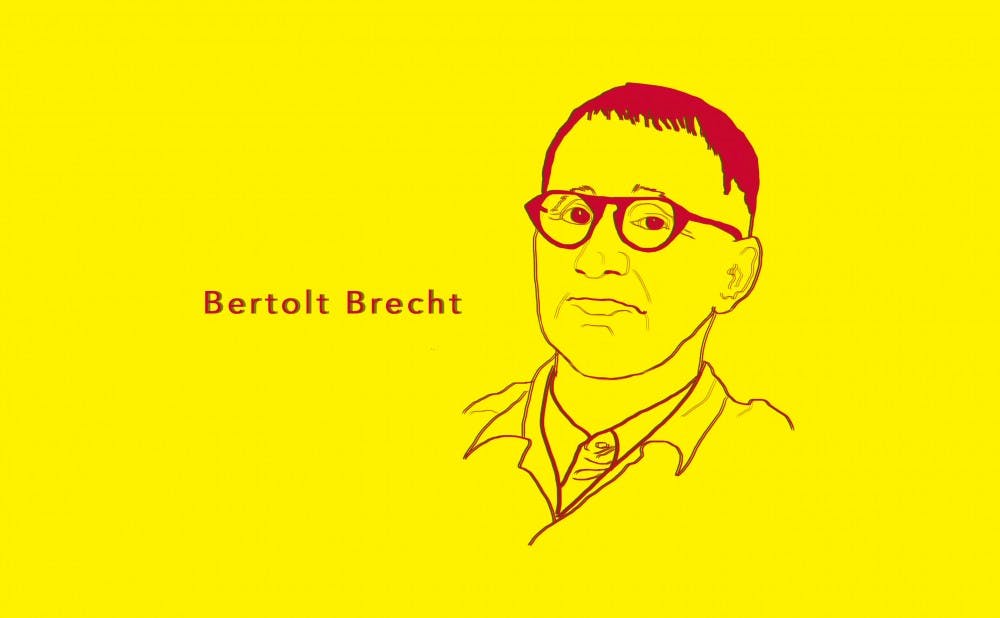When my parents moved to East Germany in the 1990s, Stalinist memorabilia still adorned many corners and offices. “Real socialism” had broken down a few years prior, but the bleak relicts of empty houses, gray skies and scarce infrastructure still made it a rather unwelcoming place. My parents probably did not pay too much heed, then, when they enrolled me at a school named after writer Bertolt Brecht, who had once been persecuted for “un-American activities” under Joe McCarthy. Neither did I, as it was simply the only school in the area. So I began my schooling walking past the bust of a socialist icon without even noticing.
For my first few years there, I cared little for Brecht’s writing, as I preferred to spend my time with comic books and action figures. It wasn’t until I was 14 that I developed into a restless reader of prose. At first, I plowed through random books I ordered off of Amazon with my allowance, but soon my appetite exceeded my resources and I decided to venture into the sparsely-frequented library my tiny, post-Socialist town had to offer. Our library, another artifact from the times of German division, carried little to no Western authors. Instead, its shelves were filled with the classics of Socialist realism: Maxim Gorki, Anna Seghers, Christa Wolf, Johannes R. Becher, Bruno Apitz and many more. Alas, their earnest stories of suffering, loyalty and proletarian work ethos didn’t appeal much to the short attention span my teenage self had to offer, so I flipped through their pages, yawning with growing disinterest.
One Friday afternoon, however, I emerged from the library with a slim, red volume in hand and quickly retreated to my room. Its arcane title, “Bertolt Brecht’s Domestic Breviary,” had caught my eye and at least seemed to promise something more jovial than the East German classics I usually read. The late cultural critic Mark Fisher once asked: “Is it possible to reproduce, later in life, the impact that books, records and films have between the ages of 14 and 17?” and I like to think that no, nothing might ever speak to me so cogently as the “Domestic Breviary” did that afternoon. The collection of ballads, songs and sonnets was unlike anything I had read until that point, so effortlessly witty, tongue-in-cheek, and yet hopelessly melancholic at times.
Contrary to common belief, German does lend itself quite well to poetry; the author just has to resist the temptation of overly complex vocabulary and syntax. Although this tendency has at times marred some classic writers like Rainer Maria Rilke or Paul Celan, the poetry of Brecht carries with it a disdain for all things vain and convoluted. In “Reminiscence of Marie A.” he writes plainly: “And yet I know what you are trying to say / But what her face was like, I know no longer / I only know I kissed it on that day.”
From that afternoon on, Brecht provided the literary backdrop to my dreamy, awkward teenage angst. His “Three-Penny Opera” was the first play I ever saw on stage, and it also happened to be the first time that I genuinely disliked a play’s adaptation. My prom night, I anxiously quoted Brecht, hoping to impress my date while waiting to get our photo taken (my attempt was hardly successful, as I now know).
I left East Germany when I was 18, first settling in Berlin and then coming to Duke. “In the grey light before morning the pine trees piss / And the vermin, the birds, raise their twitter and cheep / At that hour in the city I drain my glass, then throw / The cigar butt away and worriedly go to sleep,” Brecht writes in “Of poor B.B.,” echoing the distance between the quiet yet painfully boring life in the countryside and the suffocating rush of the city. Brecht himself was forced into exile by the Nazis, fleeing to France, Denmark, Finland and the Soviet Union before relocating to Los Angeles in 1941. More than anything, he was a figure that symbolized the first half of the 20th century in its historical entirety: the roaring parties of the 1920s Weimar Republic, the displacement and existential fear suffered under the Nazis, and lastly, the continent’s long separation under the Iron Curtain.
Brecht’s books continued to stick with me as I got older. My high school required students to submit a thesis before they graduate, and I chose to write mine on Brecht’s contemporary, Max Frisch, whose dramatic philosophy I compared to Brecht’s.
Being in college has certainly altered my reading habits and I now happily inhabit the fourth floor of Perkins rather than the post-Socialist village library of my hometown. And yet, I might not be where I am without its velvet red Brecht edition that once began my journey into literary studies. Even as I write this article, there looms above me a reflection paper on Brecht’s “Mahagonny” that I have procrastinated successfully for the last few hours. Most likely this isn’t the last thing I’ll write on Brecht, but in retrospect, Brecht’s influence has rarely let me down.
Get The Chronicle straight to your inbox
Signup for our weekly newsletter. Cancel at any time.

